本文由 裸筑更新 授权mooool发表,欢迎转发,禁止以mooool编辑版本转载。
Thanks Roarc Renew for authorizing the publication of the project on mooool, Text description provided by Roarc Renew.
裸筑更新建筑设计: 素凯泰然安若曦,古韵京南自在何?无论是六朝古都,还是暹罗泰族,神秘一词冠于东方,源于民众的信仰与习惯。素凯泰特有的自在,南京城里的街道巷韵,翩翩偌偌相映成章。东方即东方,场所在东方,文明却南偏。京南与泰北,同向而往,四面大同。在本次命题中,两种文明的共性,成为本案设计点的切入方式:场所影射而场所影射,是裸筑在项目积累过程中,逐渐总结的“设计方法论”。“场所影射”,也是裸筑第一次在一个项目的总结中,直接使用并提出的。
RoarcRenew: Both Sukhothai and the ancient city of Nanjing are places of peace that make people feel at ease and relaxed. Either for Nanjing, an ancient capital of six dynasties, or for Siam, mystery is the common term in the oriental world that originates from belief and habit of people. The special unrestrained style of Sukhothai echoes with the ambience of streets and lanes in Nanjing. The oriental world is located in the east in position but its cultivation mainly remains in the south of China. Nanjing in the south resonates with north Thailand in cultivation. The same cultural origin bonds us closely in our derections, while Erawan can also find its One World ideology in Confucianism. According to topic of this design plan, designers find a starting point from common characters of two cultivations, i.e. Place Mapping. Place Mapping is a design methodology gradually summarized by Roarc Renew in design of numberless projects. This is the first time that Place Mapping is put into practice directly in a project.
▼建筑外立面 facade of building
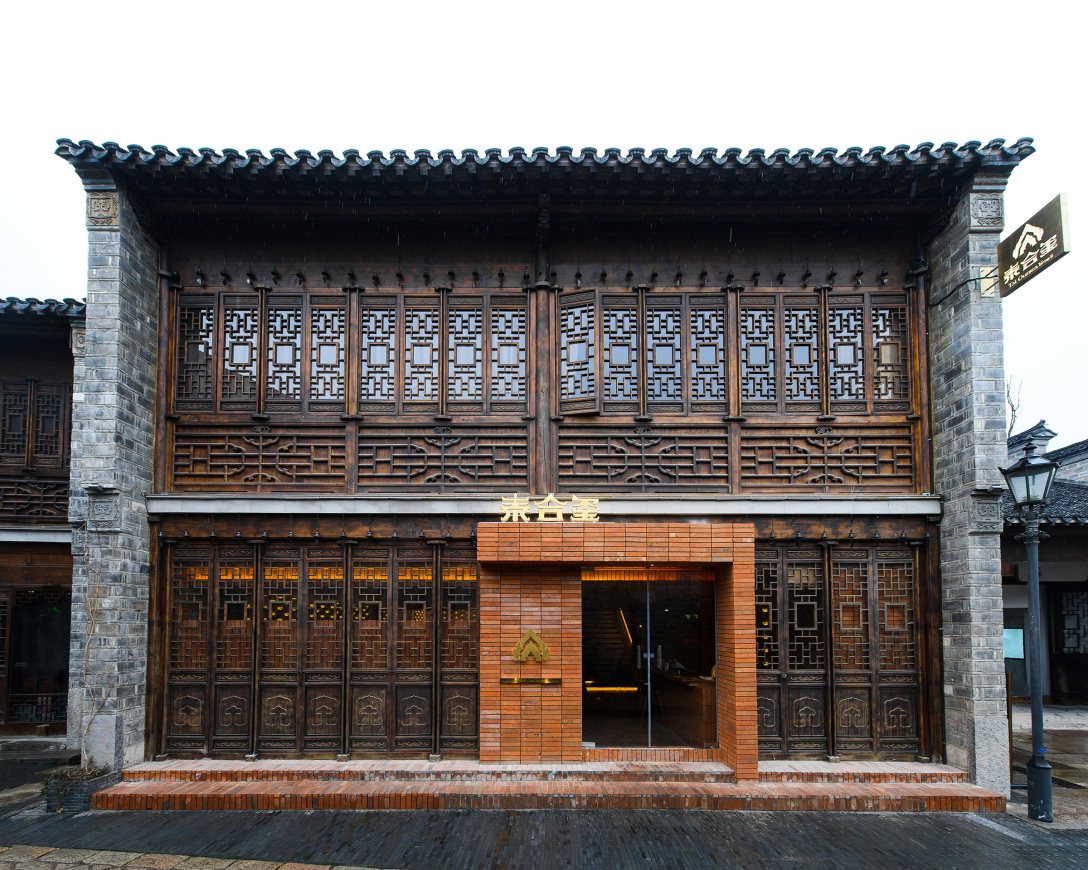
▼南京老门东街巷 Nanjing laomendong Street Lane

场所影射Place Mapping
场所影射,在于对精神尺度的把握,在于点到为止,留有一定的想象空间,是一种在精神世界留白的处理方式。影射的对象是“泰文化”或者“文化符号”。本案的业主,也是一位希望将泰式按摩技艺,泰式文化传播于国内的布道者。
The essence of Place Mapping lies in precise grasp of spirit, specifically appropriate hints and certain imaginary space. It is an approach that certain blank space is left in spiritual world. Object of the allusion is Thai culture or Thai culture symbols. Client of this design plan is an evangelist expecting to disseminate Thai massage skills and Thai culture in China.
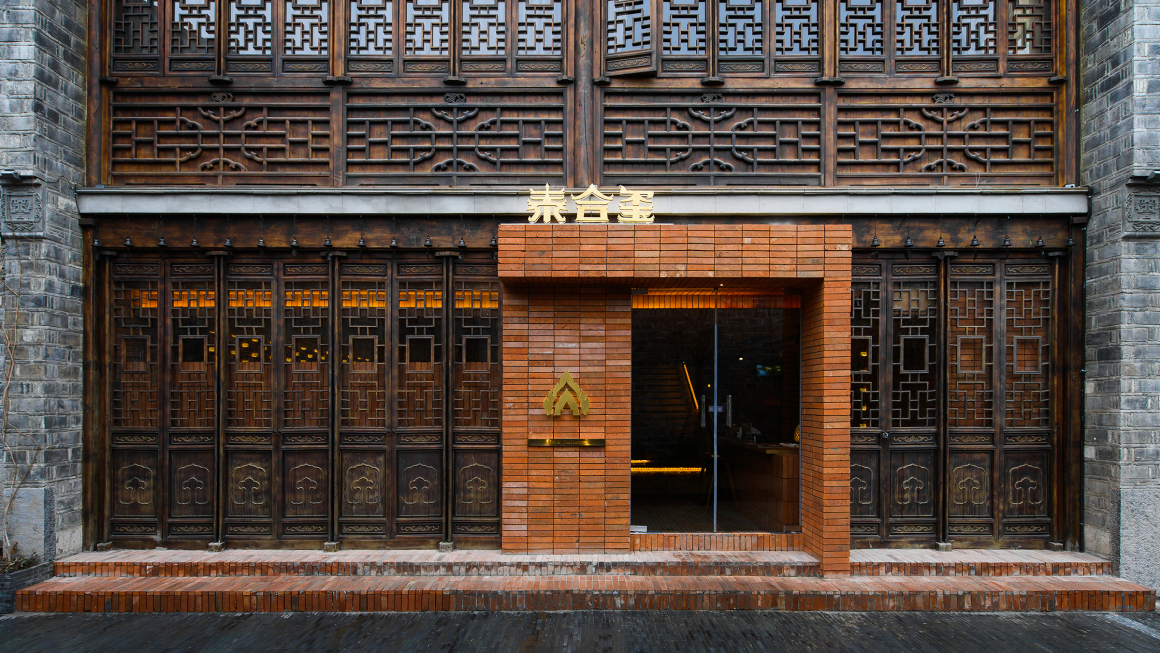
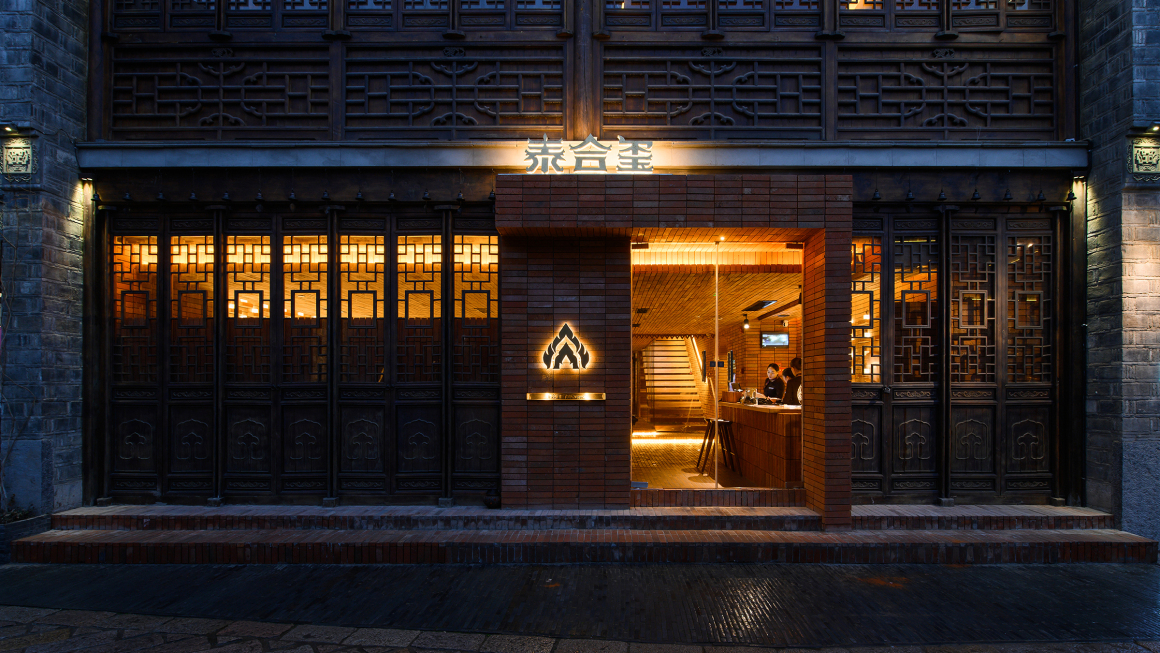
南京青砖:而本项目位于南京秦淮区中华门以东的一片商业街巷内,在经历了战火,剩存的门东建筑,被政府保护重建,按照传统样式复建传统中式木质建筑、马头墙,集中展示传统文化,意图再现老城南原貌。在门东的商业群落,基本是以“青砖”为建筑材料表现形式,建筑形式多以单体为主,旨在表达对传统建筑的传承。两种文化的具象化表达,需要的是一个载体。(文化形式)
泰北红砖:远眺清迈老城,朱红色是这个城市的色彩名片。塔佩门的遗址,古典大皇宫的红色屋顶的砌筑,暹逻建筑的基础与围墙的经典配色,便是红砖金瓦遥映鲜活的绿,红砖皆是经典常用的建材,同样这也与泰国本土的“红黏土”有关。
Black bricks in Nanjing: The project is located in a commercial street to the east of China Gate in Qinhuai District of Nanjing. After undergoing warfare, the remaining buildings in Men Dong were protected and rebuilt by the government. Traditional Chinese style wooden architecture and Ma Tau Wall were rebuilt to demonstrate traditional culture and make original style of the south part of the ancient Nanjing relived.For the commercial cluster of Men Dong, black bricks are representative building materials. Most of the buildings are monomer buildings, which aims at inheritance of traditional buildings.Concrete expression of these two cultures needs a form echoed mutually.
Red bricks in the north part of Thailand: Overlooking the ancient city of Chiengmai, we find vermilion is a representative color of this city. Relics of Tha Phae Gate, red roofing of classic royal palace and foundation of Siamese buildings match with the green fence in color. Red bricks are classic and commonly used building materials, which relates to existence of local red clay in Thailand.

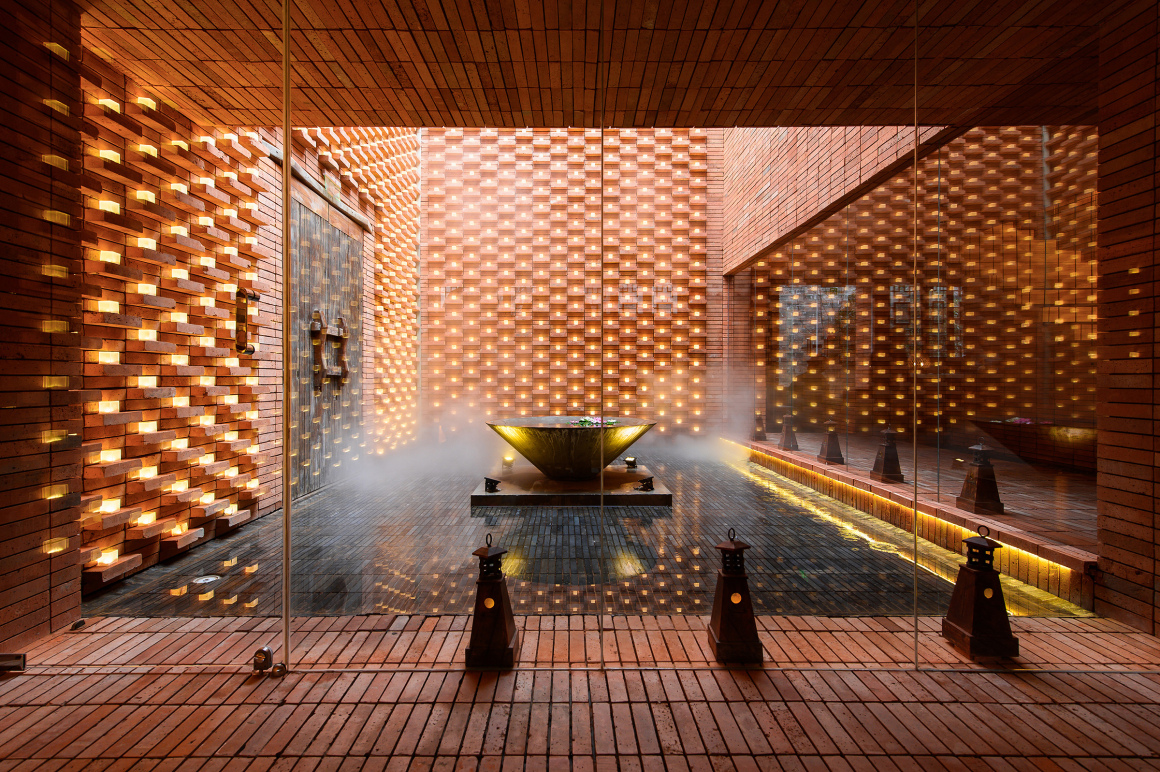
青红相接Black and red bricks
裸筑在考量了砖的“建筑性”,符号意义之后,确定其为空间的“灵魂”。青红砖是同一种材料形式,但所代表的是不同的文化。砖的缝隙使得空间产生一种隐秘的秩序感,而裸筑通过更极致的控制,加强了这样的秩序感的产生。
Identifying architecturally symbolic significance of bricks, Roarc Renew considers bricks as the “soul” of a space. Black and red bricks are the same form of material, but they represent different cultures. Gaps between bricks give people a sense of hidden order. Via an extreme control, Roarc Renew intensifies such a sense of order.

▼室内中庭 The atrium
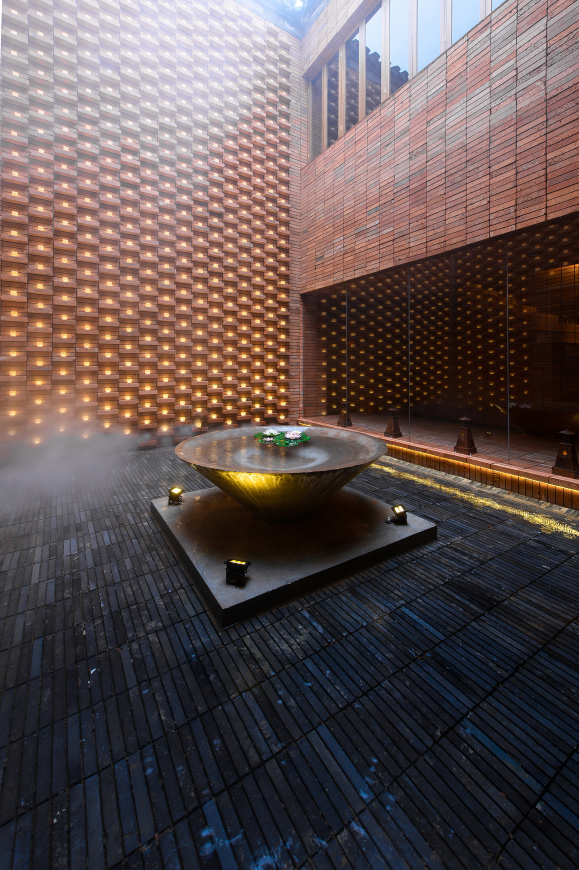
空调风口,家具,包间,玻璃砖门牌号,所有功能性的内容都指向一种纪律性的空间仪式,而这一的秩序性,都只是为了表达宗教中的“仪式感”。
All functional contents, e.g. air-conditioner air vents, furniture, compartments, glass bricks, house number plate, direct at an orderly space, which expresses a sense of religious ceremony.
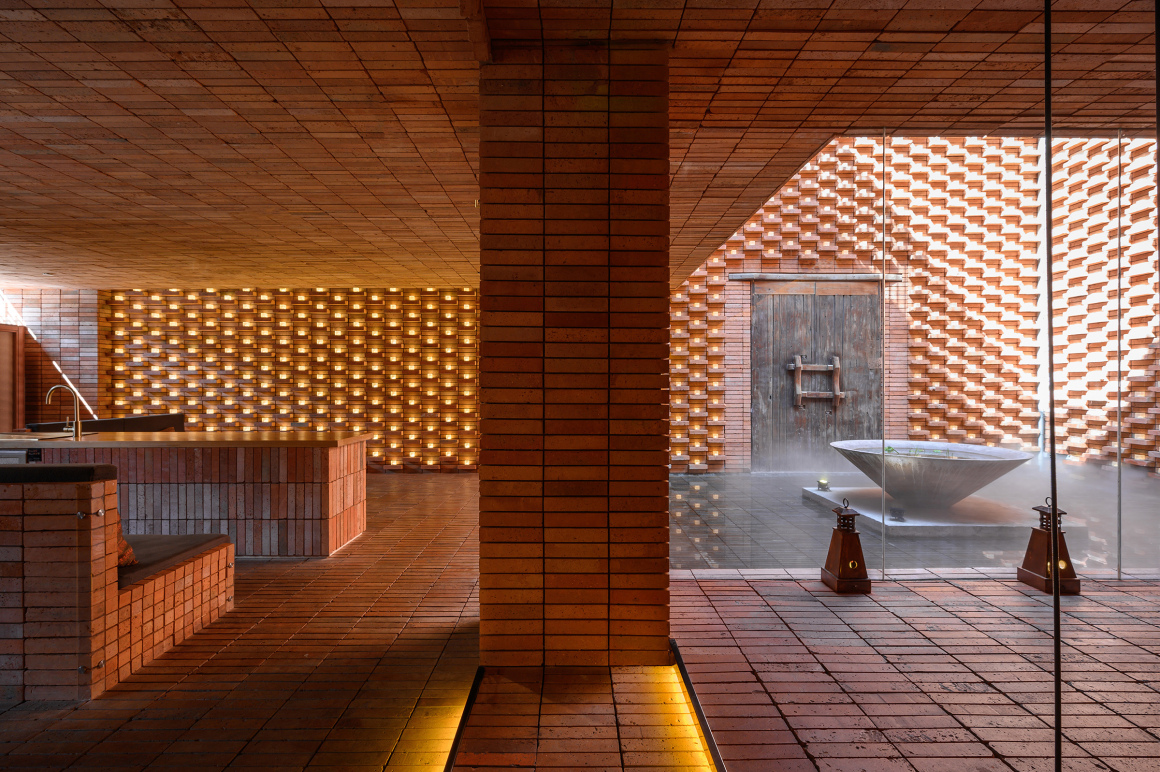

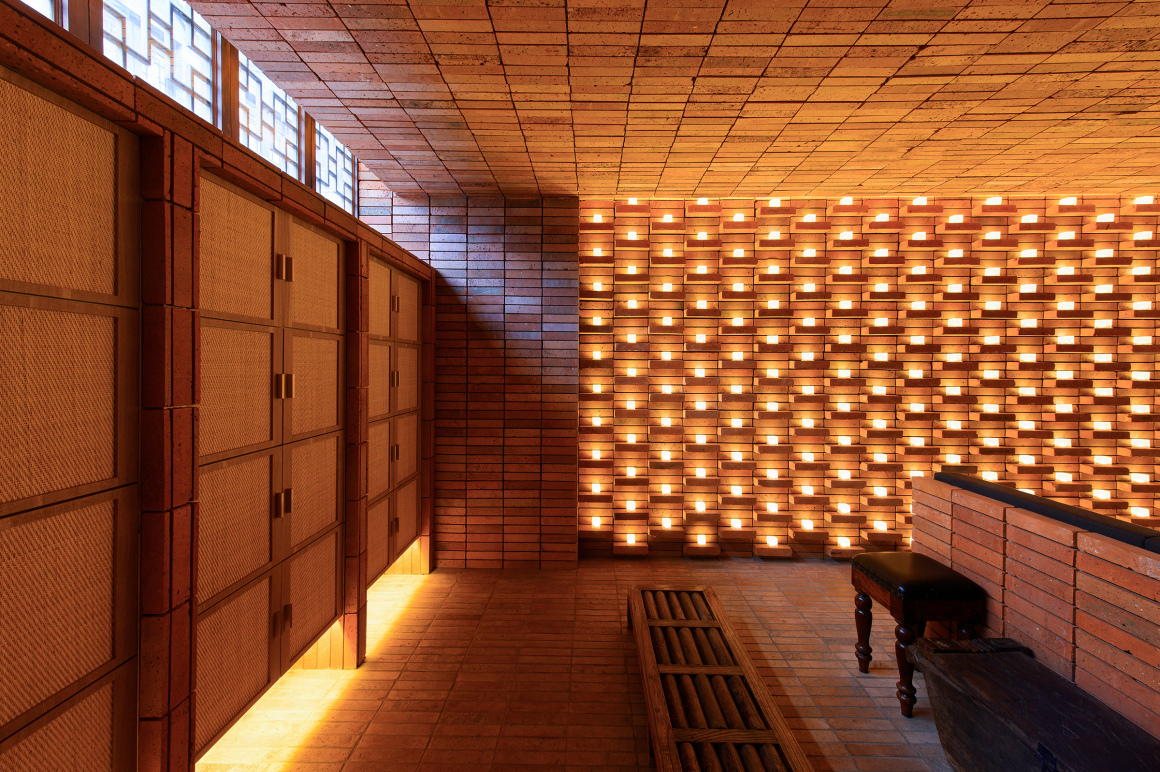

砖的粘土肌理映射的气质,更像是我们喜爱的“赤脚走在泥土上”,这种感觉是东南亚独有的,也是细微处见真章的影射。
The quality reflected by the clay texture of bricks is similar to a pleasant feeling that we have when walking in the soil barefoot. This feeling is unique in South Asia and it also reflects our perfectionism to the details.
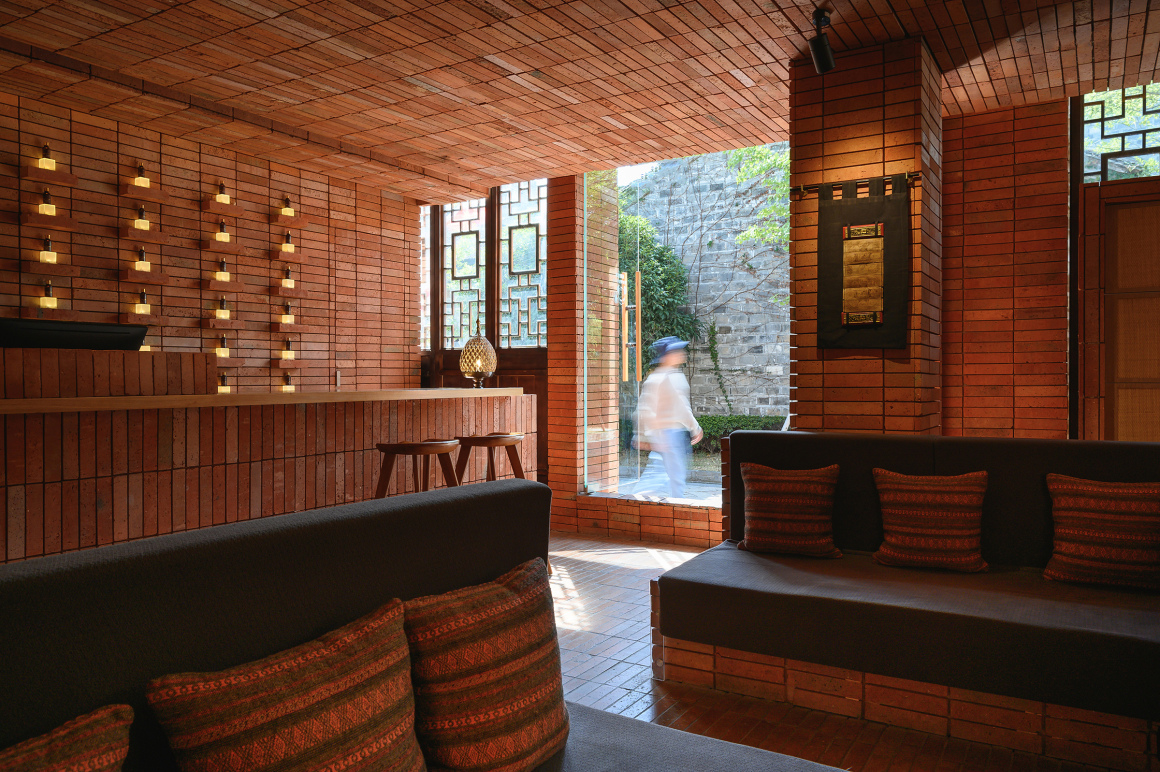
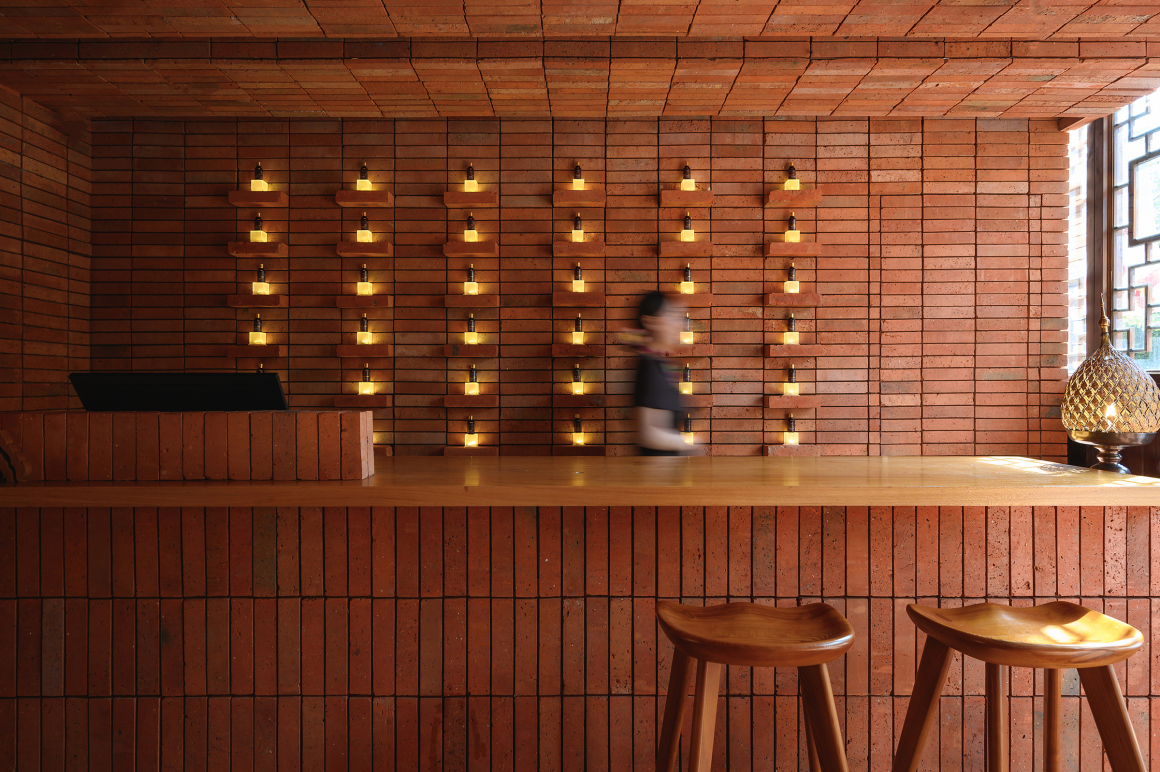
千灯Lamps
红砖的秩序拼法所表达的是空间与材料的关系,那千灯墙所影射的完全就是文化与视觉符号。
Orderly arrangement of red bricks reflects the relation between space and material, while lamp wall totally alludes to cultural and visual signs.
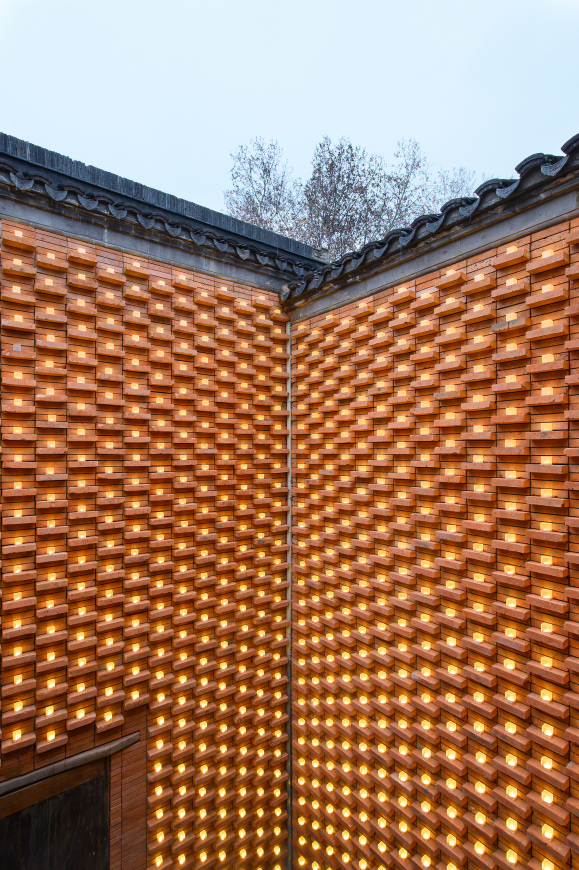

祈祷,冥想是一种宗教行为,而每一种宗教的背后,往往都体现的是“仪式感”。“建筑学”里所强调的“场域感”,往往也是通过空间营造,而形成的“神性”。当夜幕降临,千灯的绽放,除了一一对应的祝福,同时还是“场域精神”的体现,而这种场域精神,是以夜空为背景的场所。对于裸筑而言,千灯绽放所带来的心灵震撼,是自带感染力的,也因此,裸筑将“千灯”作为本案的设计点,其实是剥离了形式本体之后,将宗教所带来的“神性”与“场域精神”,完完整整的传承下来。
Pray and meditation is a religious behavior, which normally embodies a sense of ceremony. The “sense of place” emphasized in architecture is a sort of “divinity” formed through space construction. When night falls, thousands of lamps light up. It represents not only one-to-one blessing but also field spirit. The field spirit takes night sky as a background. For Roarc Renew, the heartshaking effect brought by lighting-up of thousands of lamps is appealing. Hence, Roarc Renew takes the thousands of lamps as a design point of this plan. Actually, without being restrained by form, the “divinity” and “field spirit” of religion are completely inherited in this design.
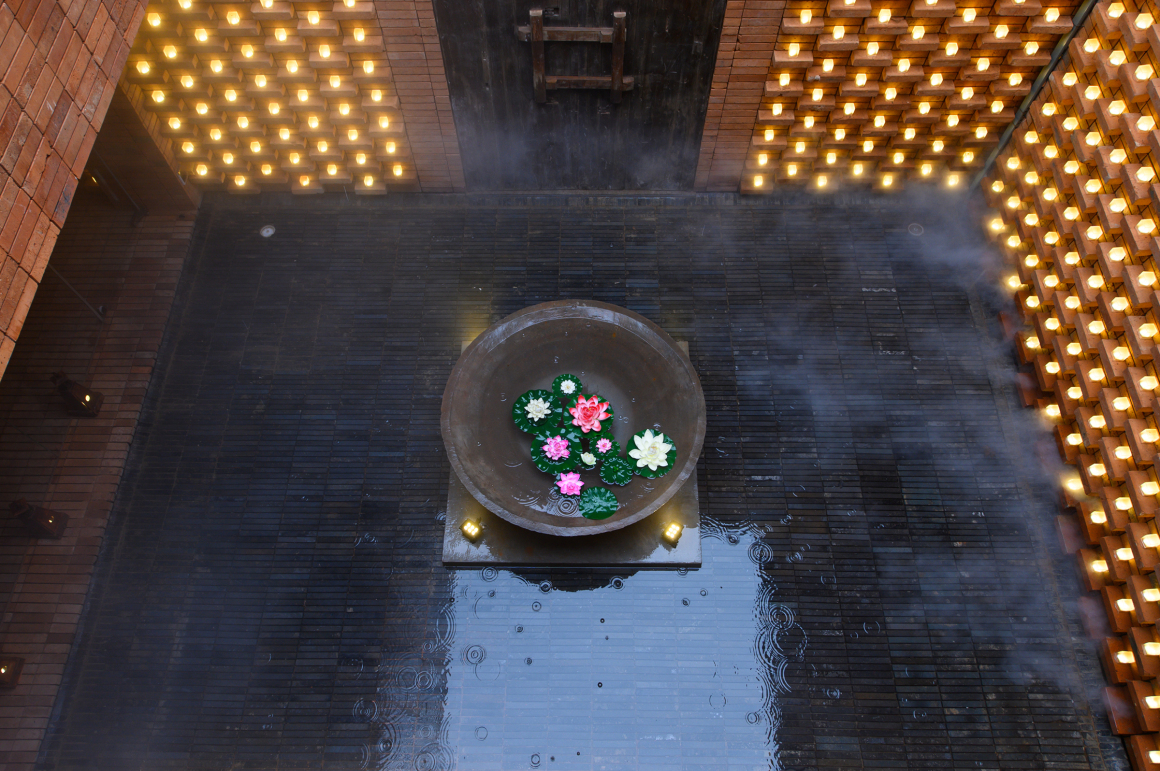

在工艺制作上,灯具盒子做了特别的抬高与防水设计,从而保证在户外空间的使用与耐候。千灯盒也特意被设计成方形,同样也是为了呼应整体红砖的秩序留缝。
In the aspect of craftsmanship, there is a special elevated and water-proof design for lamp boxes, which guarantees its usage and weather resistance in outdoor space.The lamp boxes are especially designed in square to echo with orderly gaps left in red bricks.

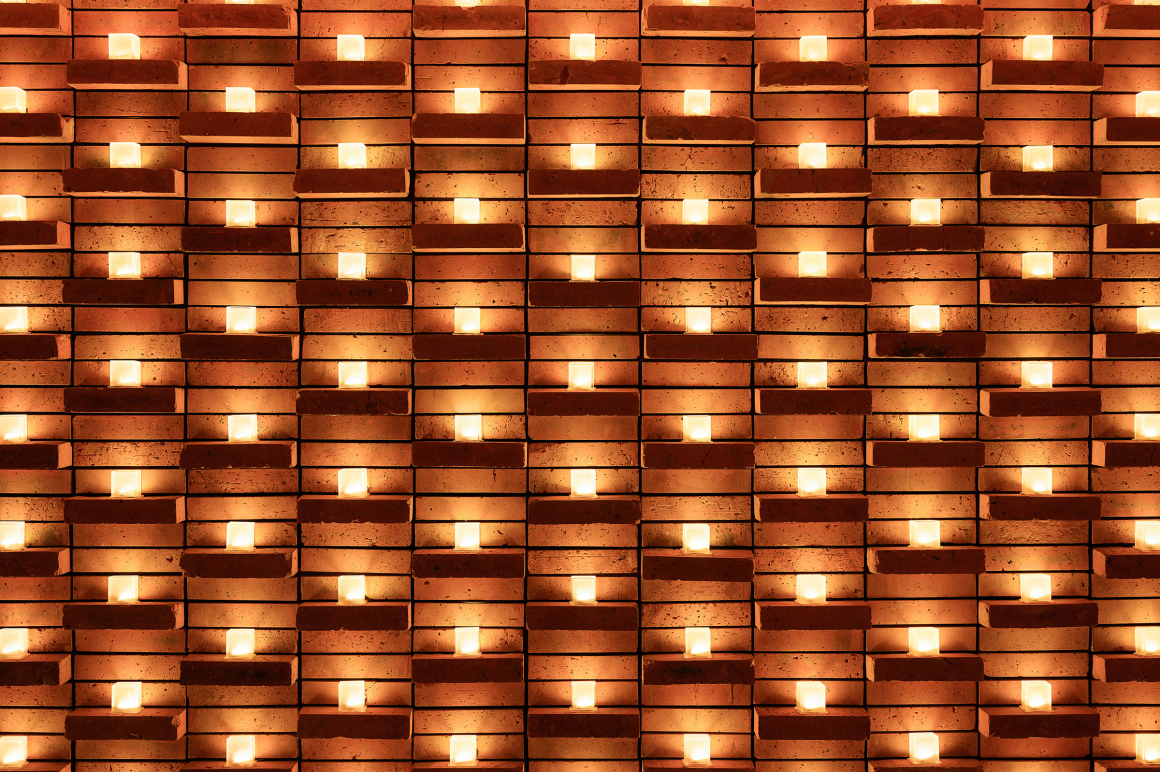
秩序中的惊鸿一瞥An unusual effect in an orderly space
裸筑对红砖也做了不同的加工处理,根据不同的收口,红砖被分成5中不同的尺寸来顺应不同的收口要求。
Roarc Renew processes red bricks differently. Based on different closing processes, the red bricks are classified into five different sizes to conform to different requirements for Details Joints.
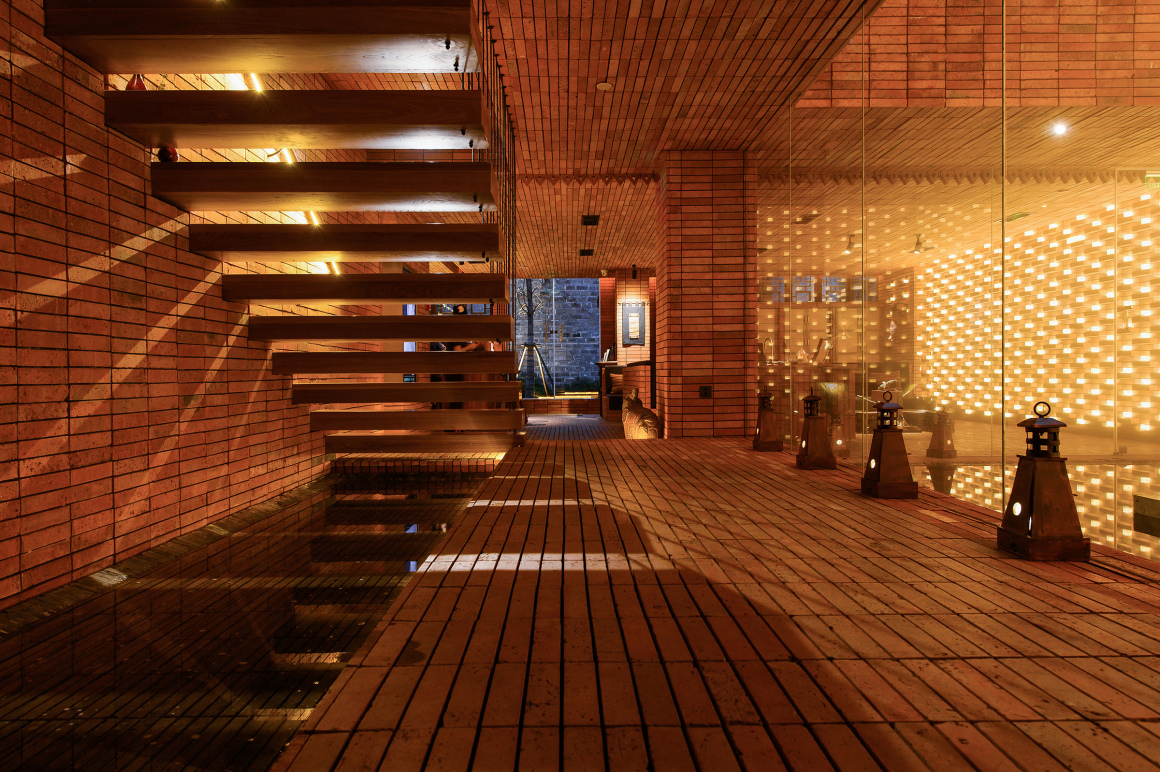
▼楼梯节点细节 details of stairs
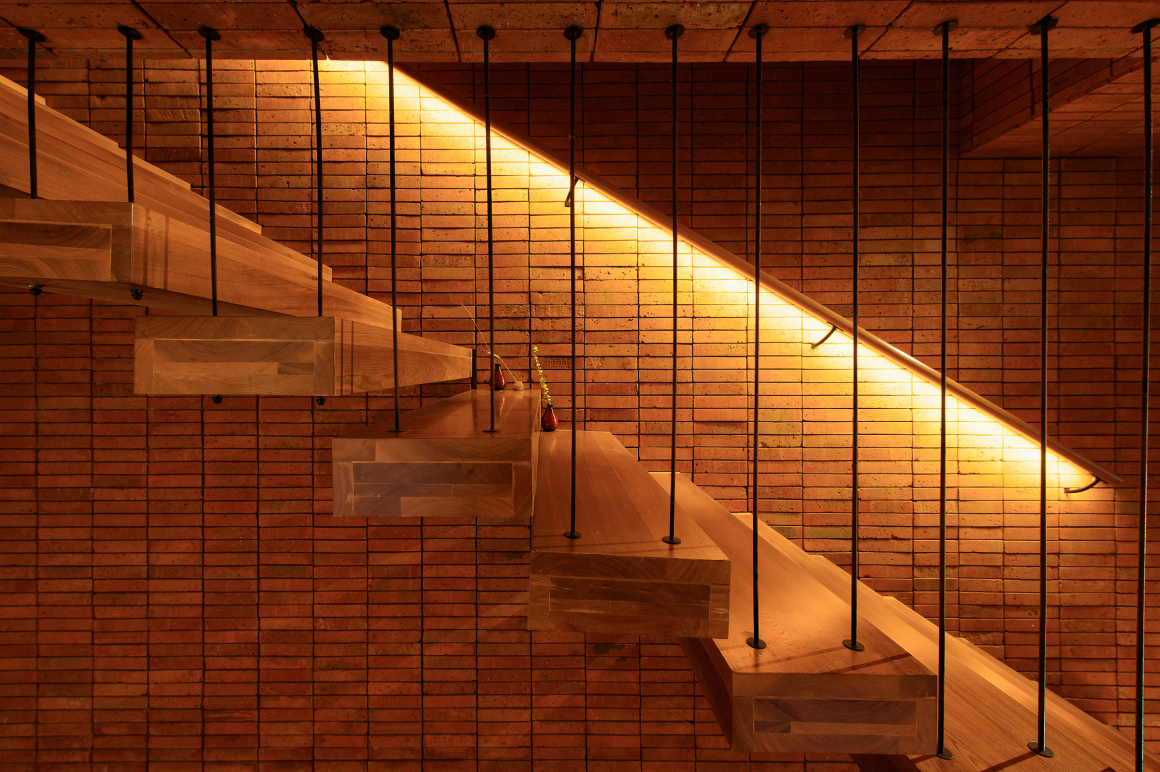
在细部表达上,裸筑选取了含有吉祥寓意的泰文字,阴刻于红砖面上,散落在空间里以追求“秩序中的惊鸿一瞥”,这一瞥,是点睛一笔,同时也是对泰文字的尊重与强调。
As for some details, Roarc Renew intaglios Thai characters which symbolize good fortune on the surface of red bricks. These characters are spread in the space to create a surprise effect in an orderly space. This is a punchline showing respect and emphasis toward the value of Thai characters.
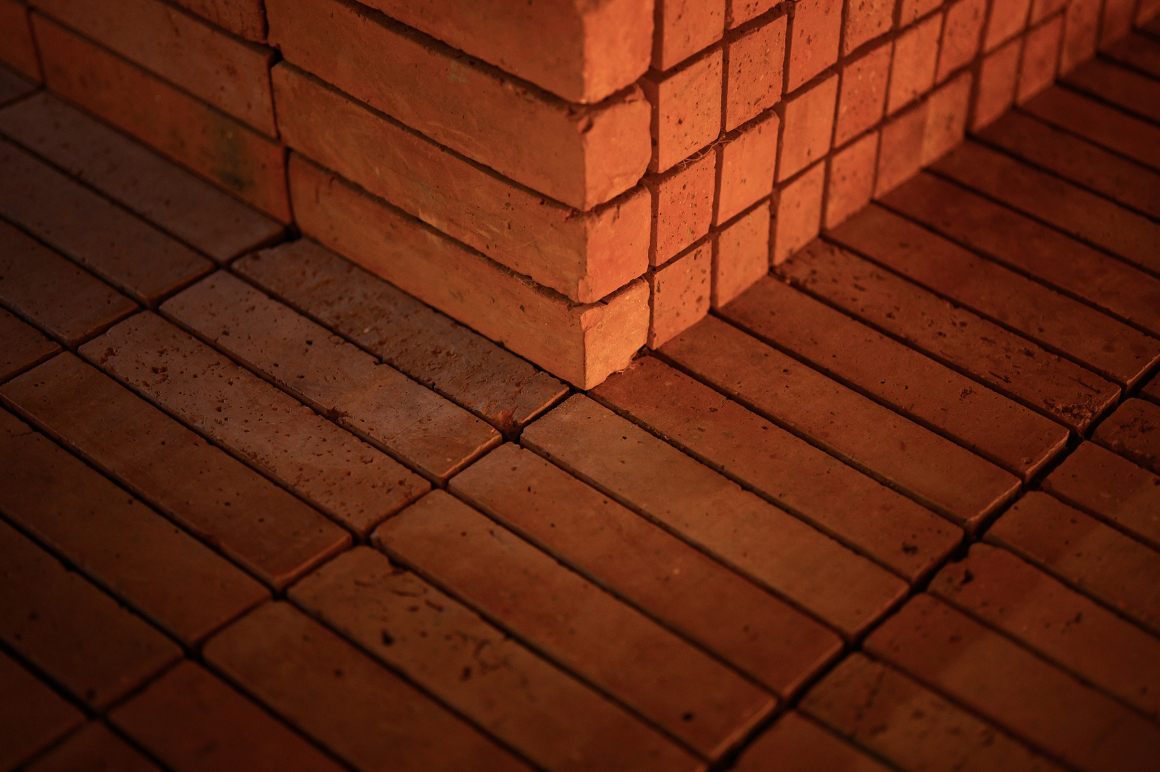
▼天花细节:由红砖水切割制而成的泰合玺符号 Ceiling details: the symbol of Thai characters cut from red bricks

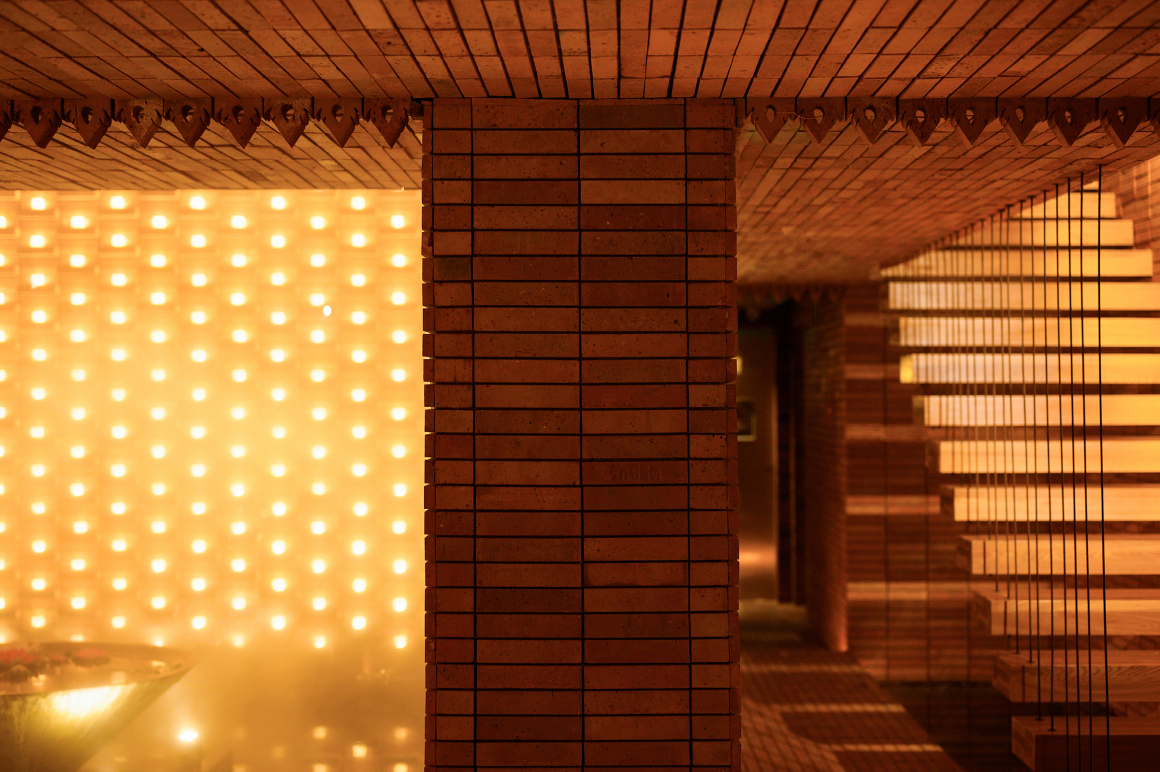
▼通往二楼的双动线 stairs to the second floor
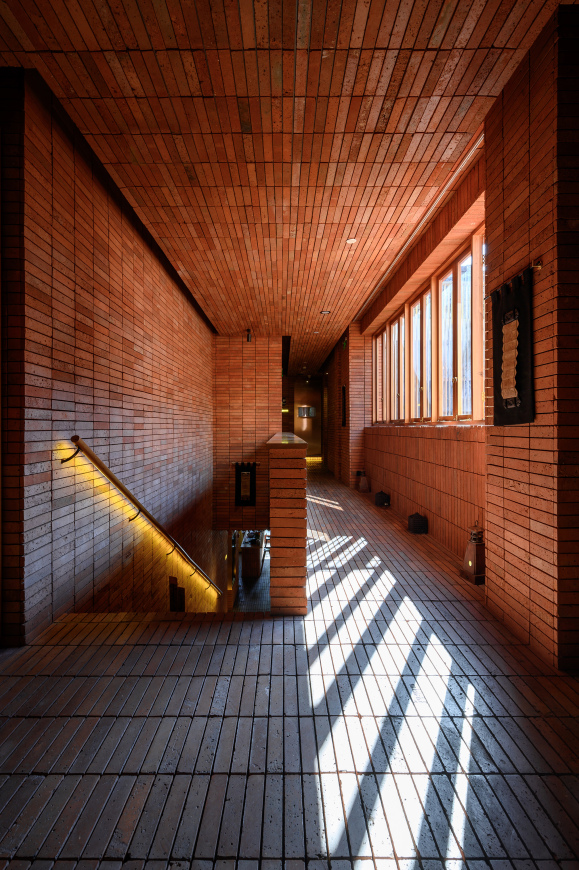
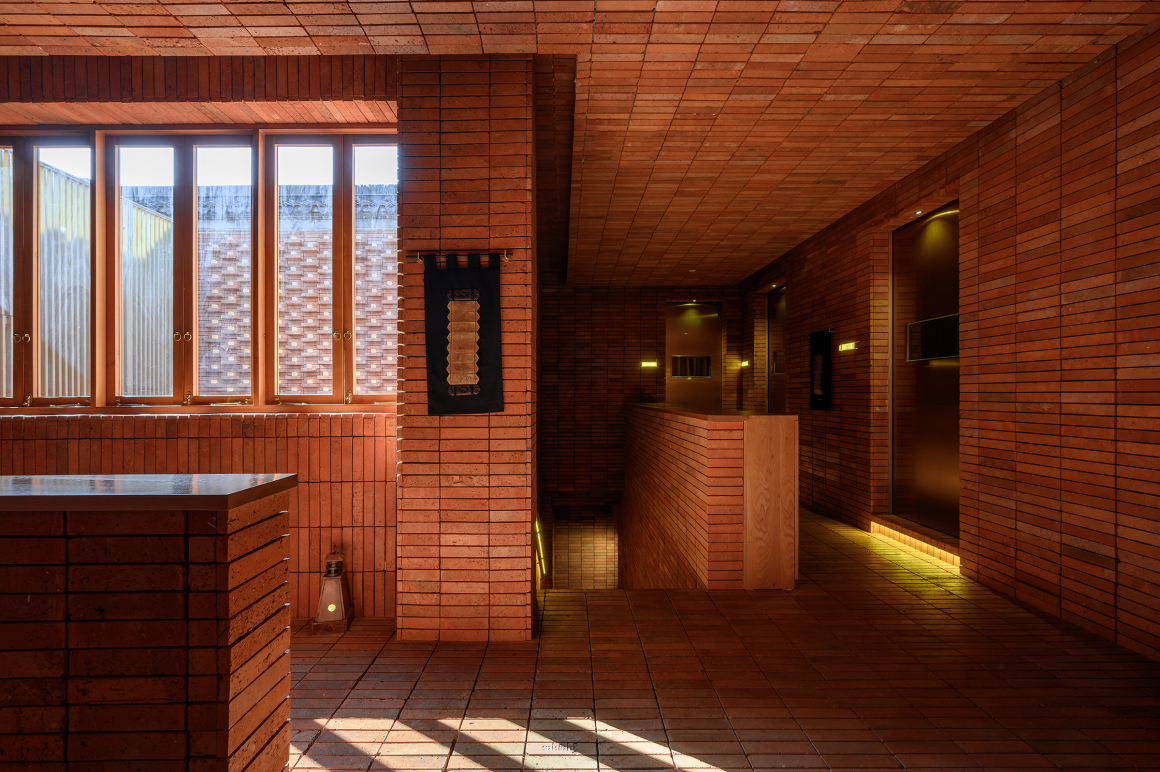
▼通往二楼包间的过道 The aisle to the compartment on the second floor
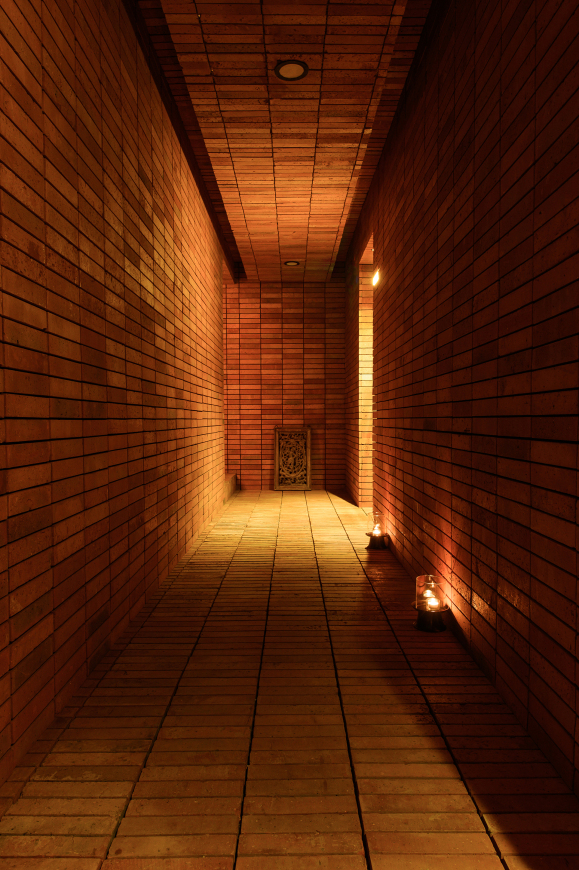
装饰物件Decorative articles
对于泛酒店类项目的把控,裸筑坚持从设计方案贯穿至软装及灯光。对于裸筑而言,相对排斥装饰上的堆砌,如过多繁复的纹样,而更愿意将软装的器物做为“点睛一笔”来使用。
Roarc Renew takes charge of design of Hotel-scale projects from design plan to soft decoration and lighting. Roarc Renew would never like excessive use of decorative articles, e.g. overcomplicated patterns. Instead, it prefers to us decorative articles as punchlines.
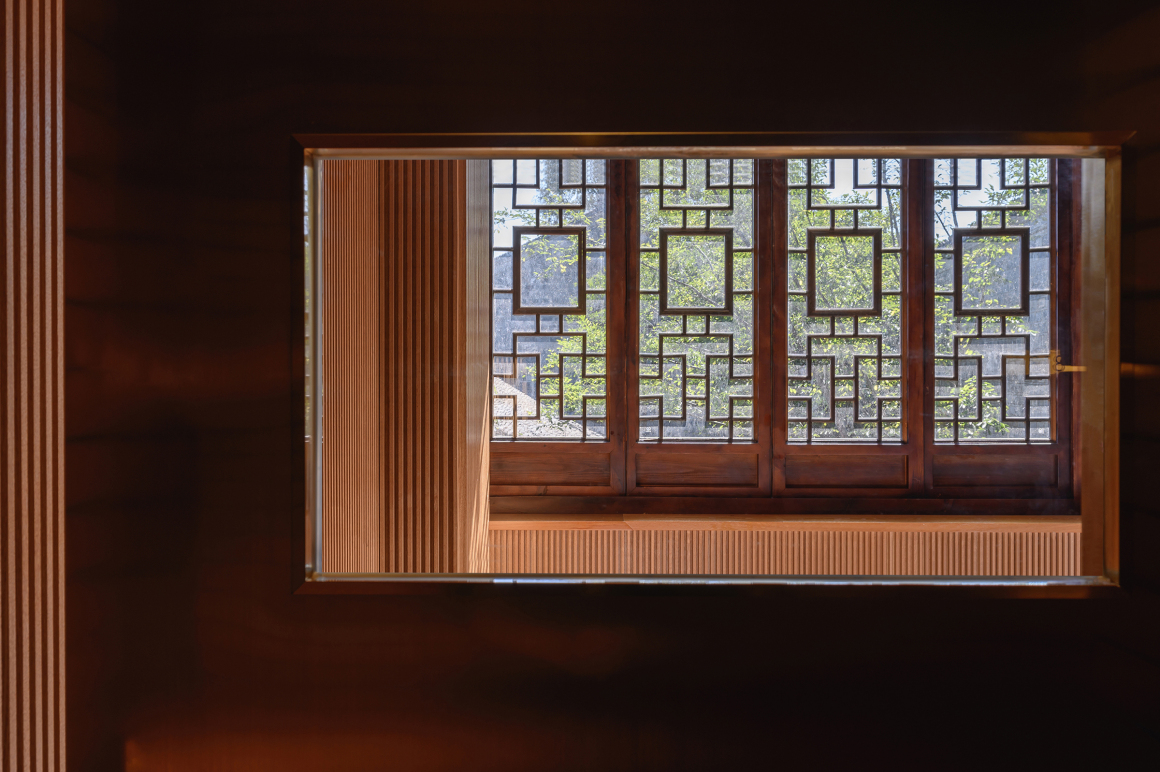
▼包间内部 compartment
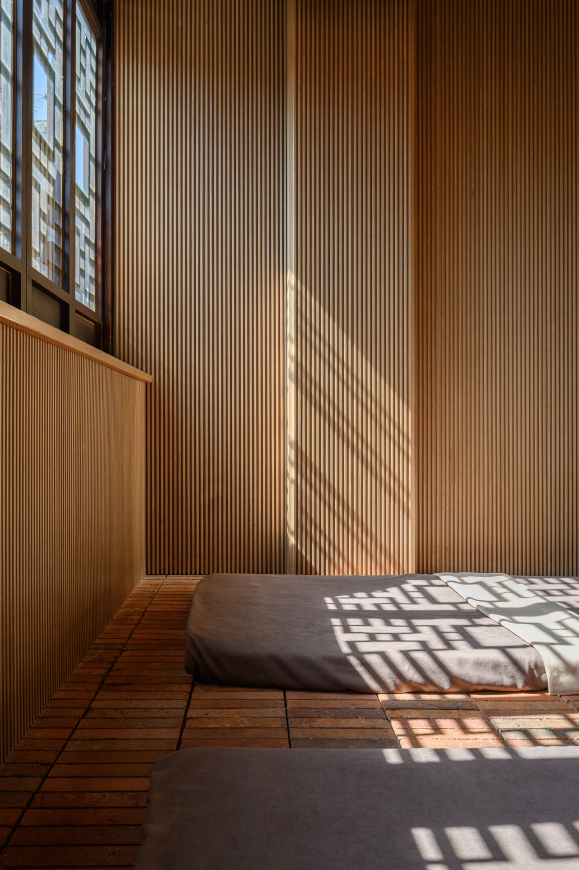
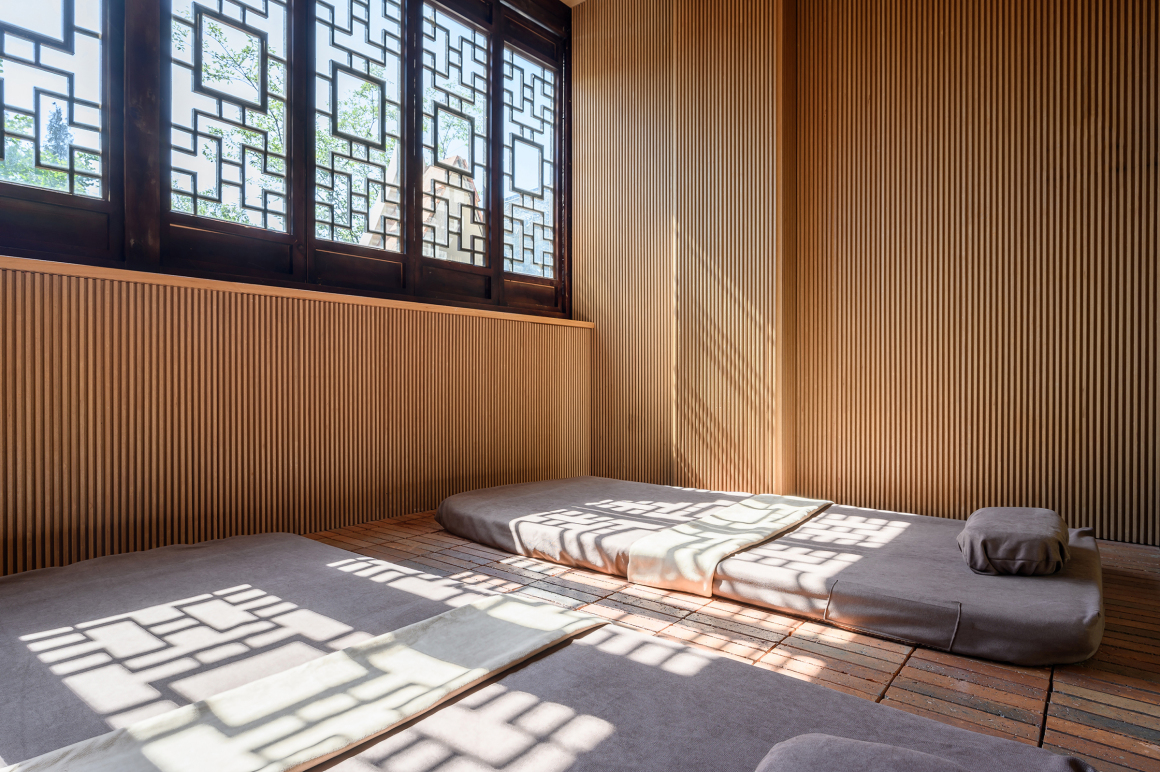
每一处的物件,都源于裸筑对空间的理解。东南亚五国,都是从农业,手工业发展而来的,至今还保留着各种传统工艺,比如编织工艺,木器,纺织,印染等传统手工业的习惯。而正是由于这样的历史积累,才有了东南亚璀璨的文明。所以裸筑在挑选软装饰品的时候,特意将关注点留在了手工器物上,装饰品虽不是古董,但每件都有其功能与意义。
Arrangement of each article originates from Roarc Renew’s understanding of space. All the five countries of Southeast Asia are developed by relying on agriculture and handicraft industry. They still maintain various traditional handicrafts to this day, such as basketry, carpentry, textile, printing and dyeing and some other traditional handicraft industries. Brilliant cultivation of Southeast Asia is exactly originating from historical accumulation. For this reason, Roarc Renew pays a special attention to handicrafts when picking decorative articles. Although they are not antiques, each of them has its function and significance.
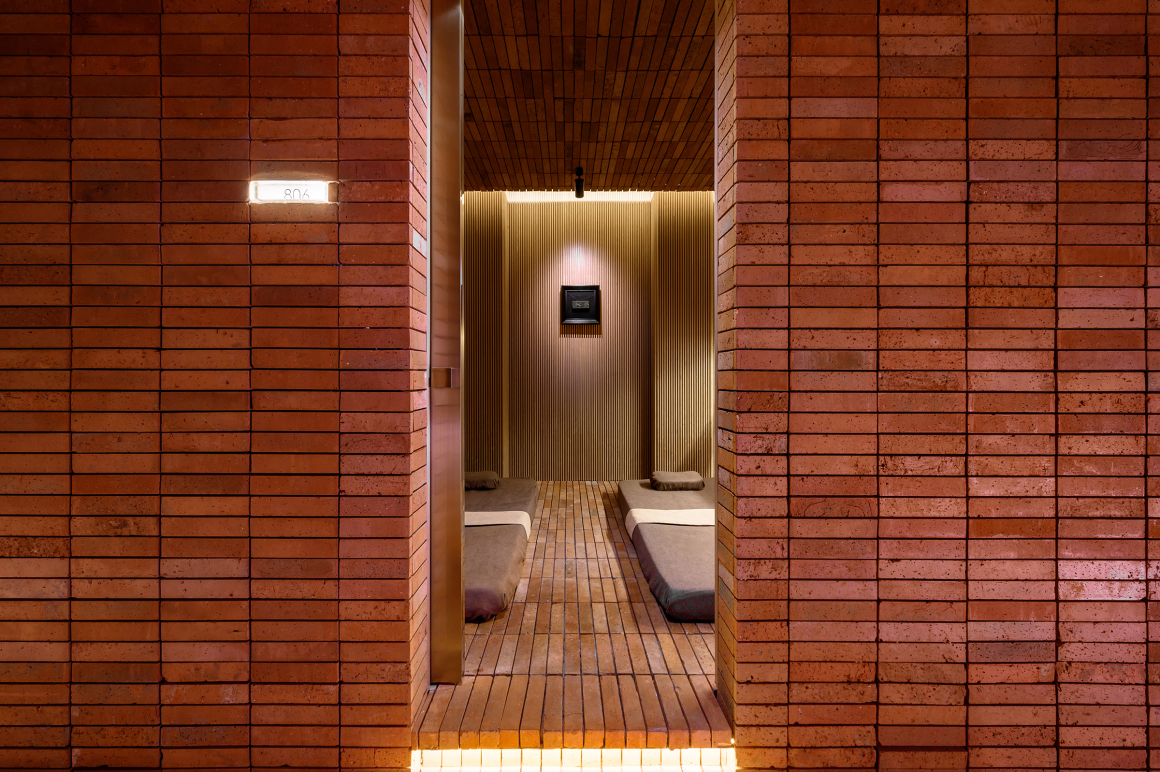
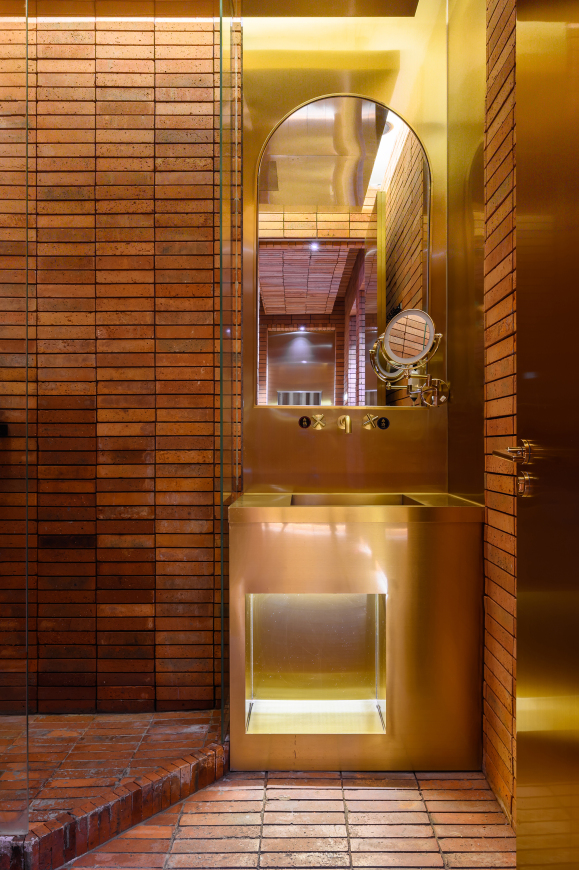
包间的挂壁,是缅甸纺织所里,特有的印花模具,衣服上的花纹,是通过这类模具拓印成型,甚至许多这样的模具上还残留着印刷燃料。带有古泰文字的诵经金牌,每日诵读带来好运,也是当地文化中重要的吉祥符号。
入口的铜镜,桌面上的方巾,铜器荷叶盘,都来自于印度,缅甸,通过这些不同地方产的手工制品,看到东南亚文明对自身传统文化的尊重。
Articles hanging in the compartments are unique printing moulds from Burmese textile workshops. Patterns on clothes are made with these moulds. There is even some printing fuel remaining on most of these moulds.There are golden chanting plates with ancient Thai characters. People believe that chanting everyday may bring luck. This is also an important lucky symbol in local culture.
Bronze mirror at the entrance, square hood over the table, bronze lotus leaf-shaped disks all come from India and Burma. We can see the respect of Southeast Asian people toward their traditional culture from these handcrafts from different places.
▼来自印度、缅甸的室内软装 Handicrafts from India and Burmese
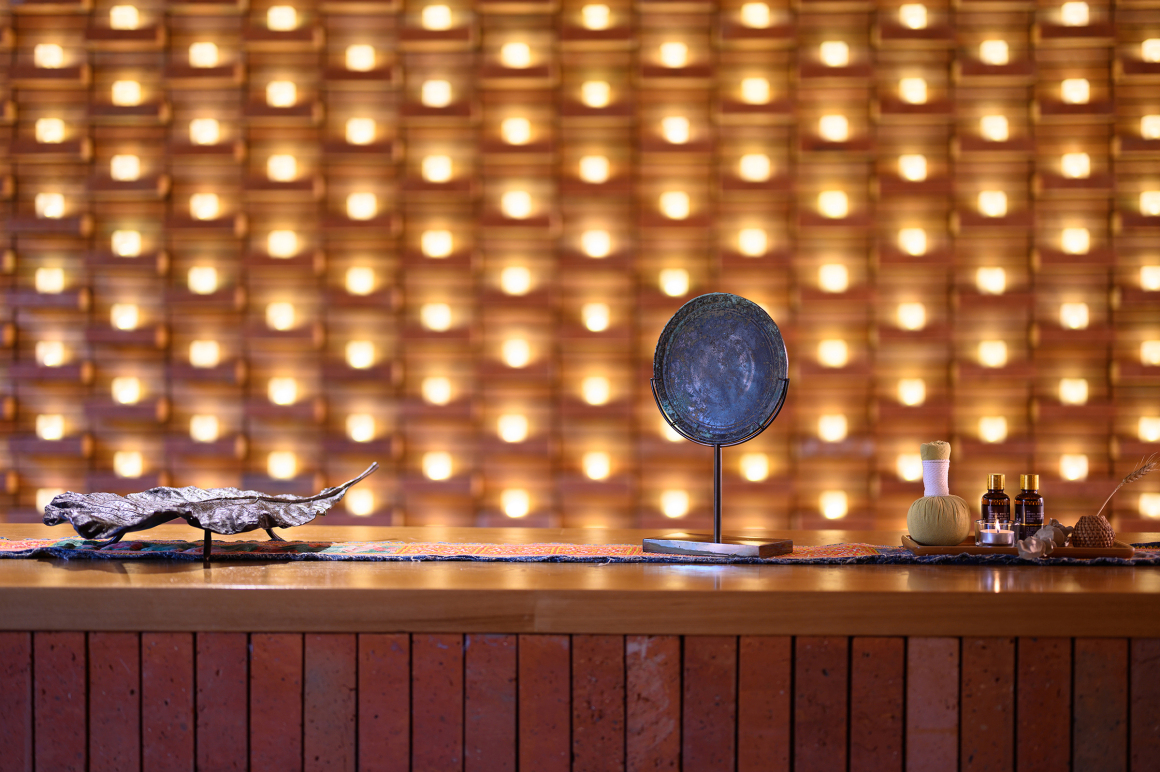

在这个时代,所有的东西都可以被复制,唯独岁月不行。而岁月时光,成为了我们最有价值的物件,也是真正我们应该区发现并保留下来的。文明得以延续,也是因为这一个又一个的故事与传承。
In this era, all can be reproduced except for time, which is the most valuable thing and also a thing we should discover and maintain. Cultivation continues as stories are passed down successively.

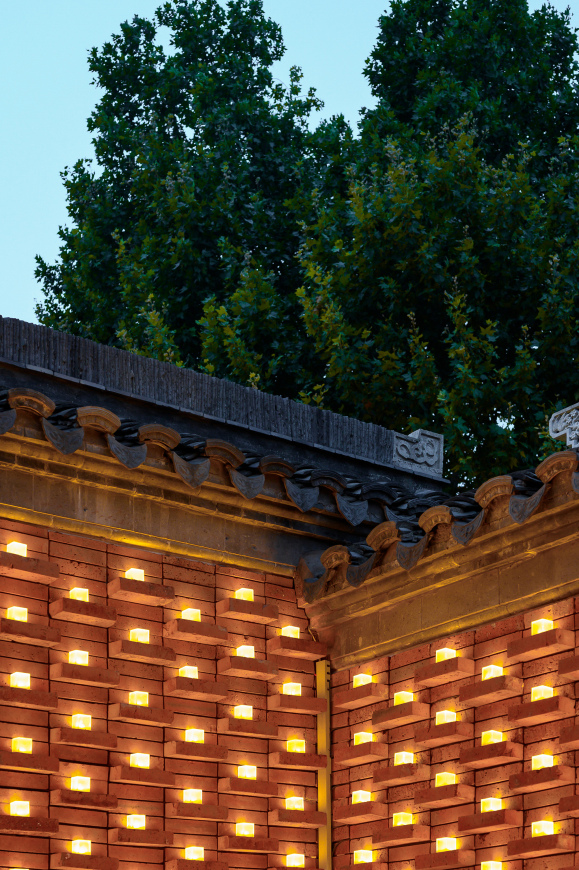
天青色等烟雨的是南京,而面佛僧袍洗红墙,是不是就是清迈?青红相接,是否惹人更期待?
Nanjing is featured in dark sky and misty rain while Chiengmai is featured in monks, robes and red walls.
Isn’t it more anticipated if these two are combined?

▼材质图 material
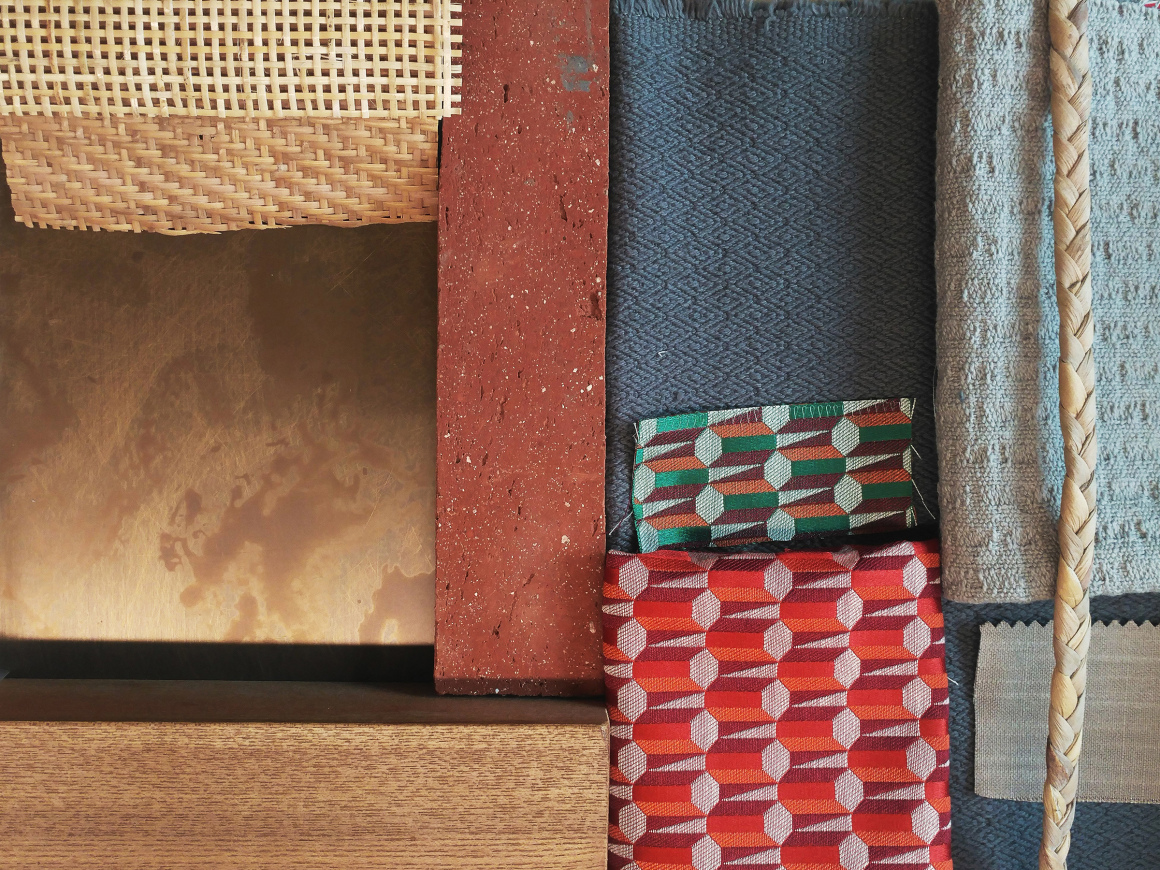
▼1、2楼平面图 1、2F plan
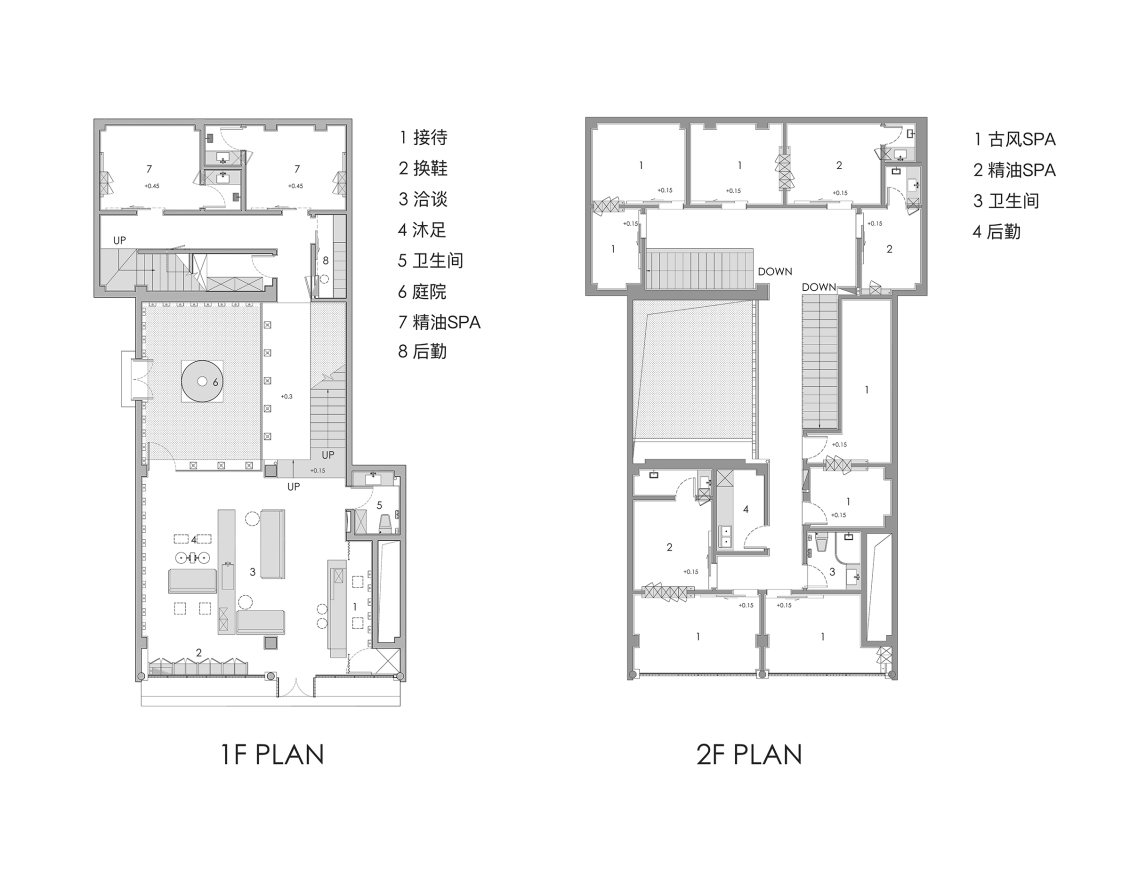
▼空间轴测图 axonometric drawing

项目名称: 泰合玺南京老门东SPA馆
项目地点: 中国南京
项目地址: 江苏省南京市秦淮区陶家巷老门东张家衙18-1号
基地面积: 450平方米
建筑面积: 450平方米
立面及室内设计: 裸筑更新建筑设计事务所 roarc.cn
主持建筑师: 柏振琦
设计团队: 林艳,薛乐骞,陆慧沁,吴叶静,杨俊一,顾倩
结构工程师: 吴传义
灯光设计: 降昭龙
施工顾问: 张成华 结庐装饰,唐远华 澳洋装饰
施工方: 泰州澳洋装饰工程有限公司
摄影师: Freeman
业主: 泰合玺健康科技
主要建材: 红砖 科技木皮Harmerhome布艺 不锈钢渡铜面板
设计时间: 2018.09-2018.11
施工时间: 2018.12-2019.04
Project name: TaiOursea Laomendong SPA Shop
Location: Nanjing, China
Address: No. 18-1, Zhangjiayan, Laomendong, Taojia Lane, Qinhuai District, Nanjing, China
Base area: 450 square meters
Building area: 450 square meters
Architectural and interior design: Roarc Renew (roarc.cn)
Principal architect: Zhenqi Bai
Design team members: Yan Lin, Leqian Xu, Huiqin Lu, Yejing Wu, Junyi Yang, Qian Gu
Structural engineer: Chuanyi Wu
Lighting Design: Zhaolong Jiang
Construction consultant: Chenghua Zhang from Shanghai Jielu Decoration Design Engineering Co., Ltd. ;Yuanhua Tang from Taizhou Aoyo Building Decoration Engineering Co., Ltd.
Constructor: Taizhou Aoyo Building Decoration Engineering Co., Ltd.
Photo credits: Freeman
Client: TaiOursea Health Technology Co., Ltd.
Main building materials: Red bricks, high-tech wood veneer, Harmerhome fabrics, copper plated stainless steel panel
Date of design (start and completed date): 2018.09-2018.11
Date of construction (start and completed date): 2018.12-2019.04
更多 Read more about: 裸筑更新建筑设计


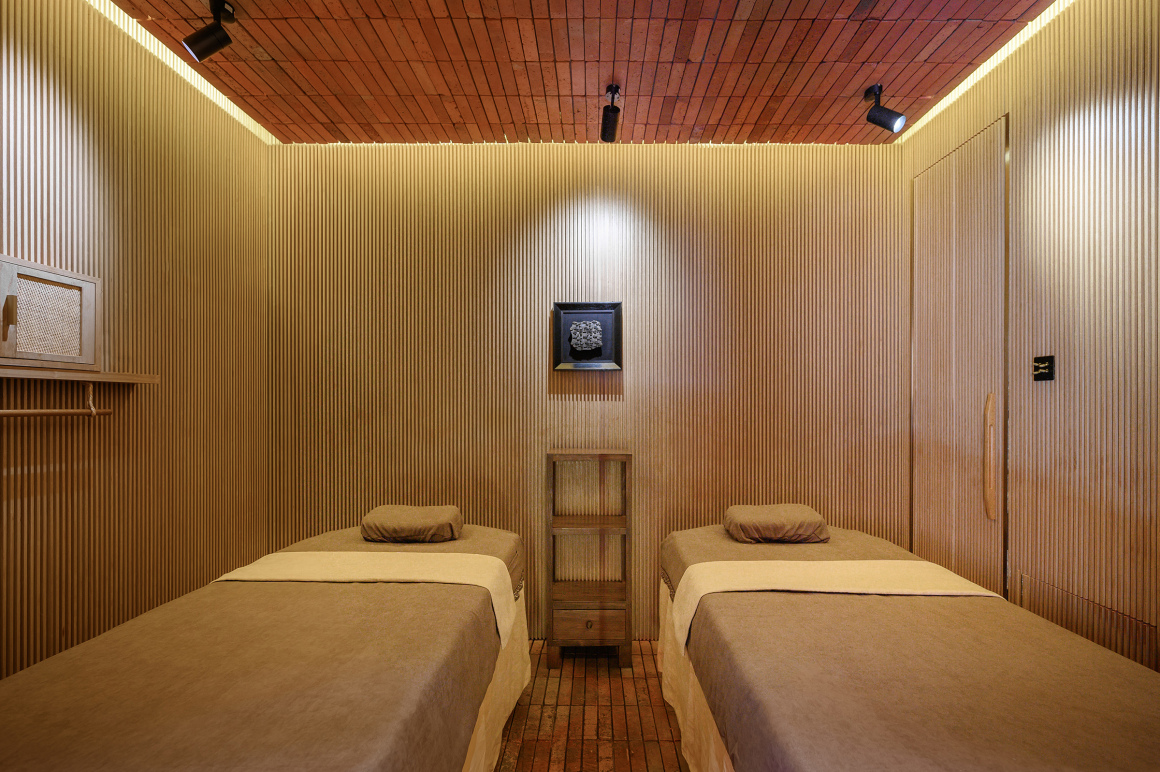
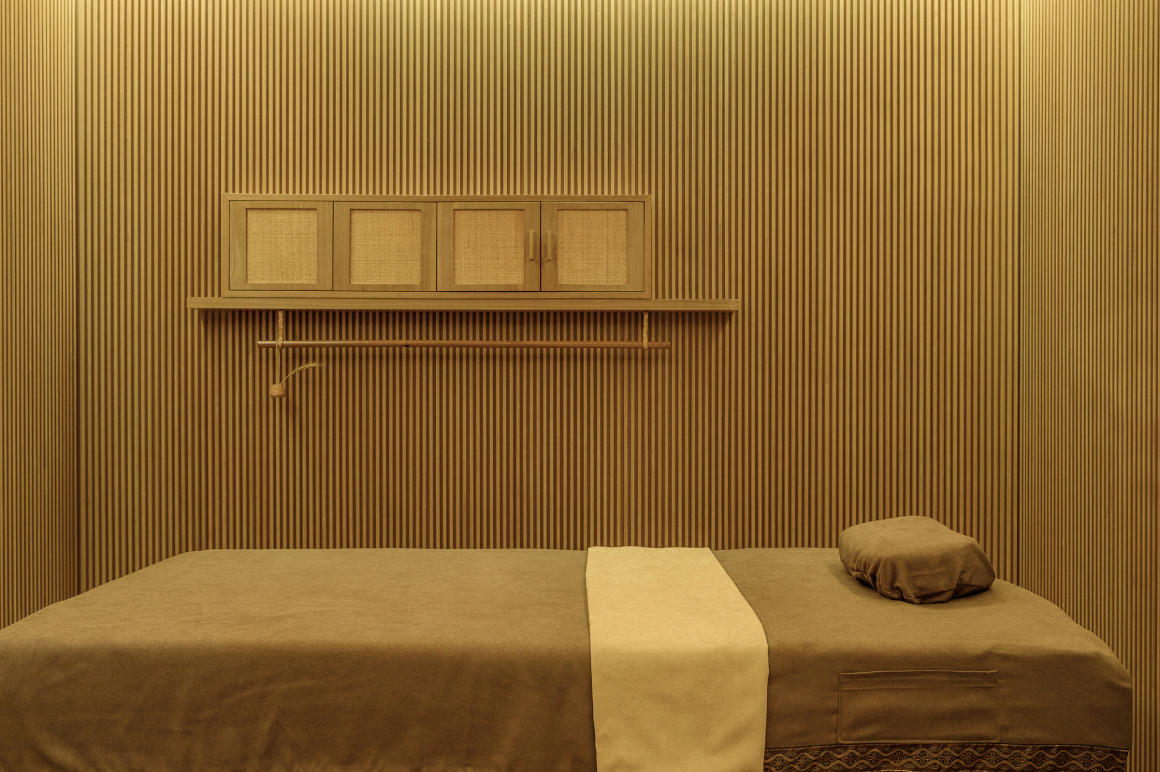


0 Comments